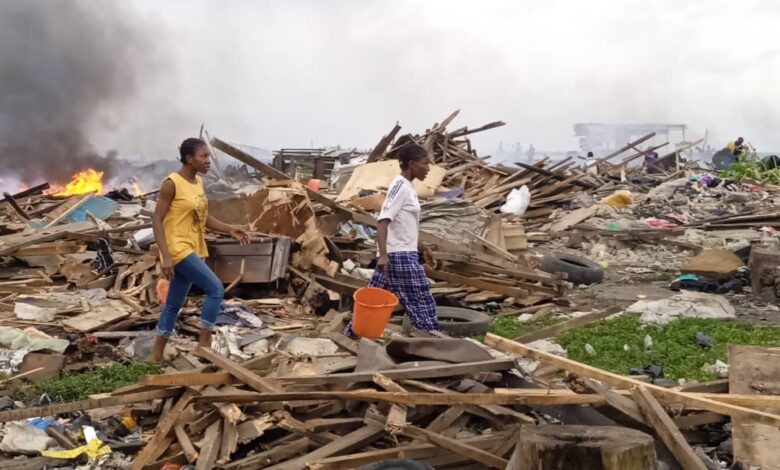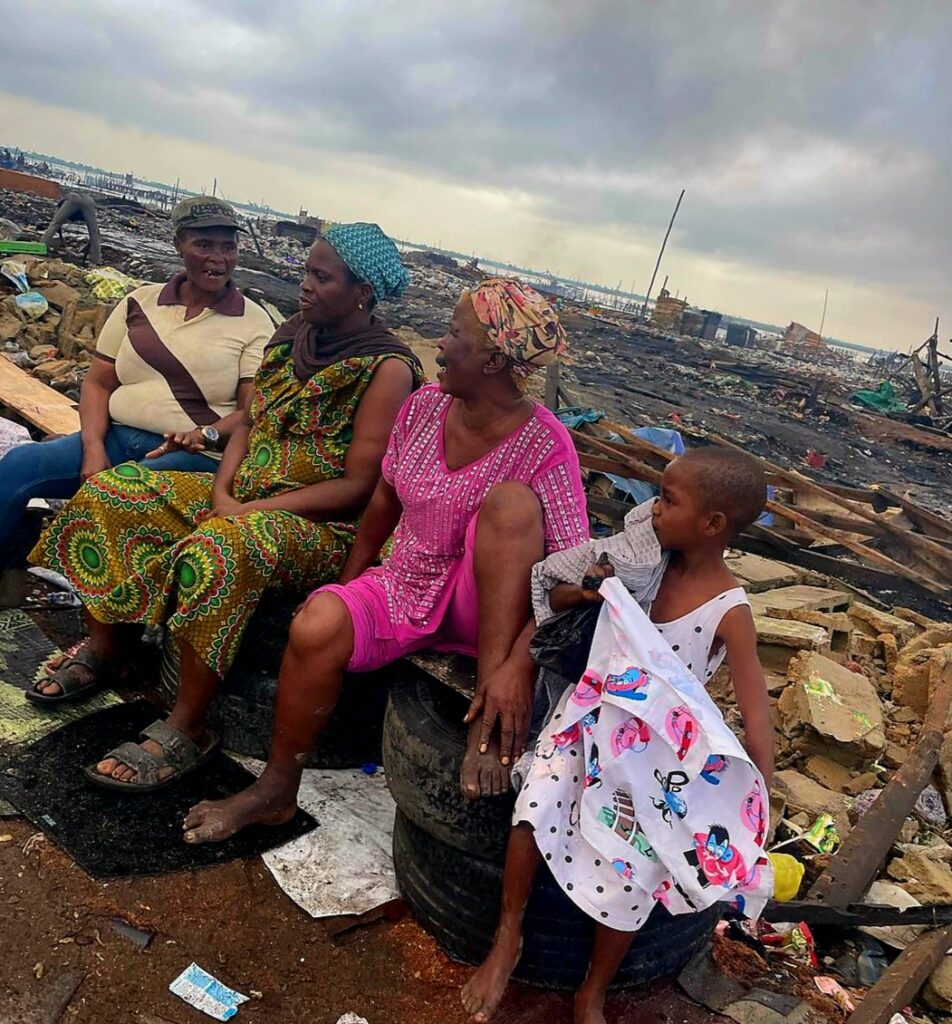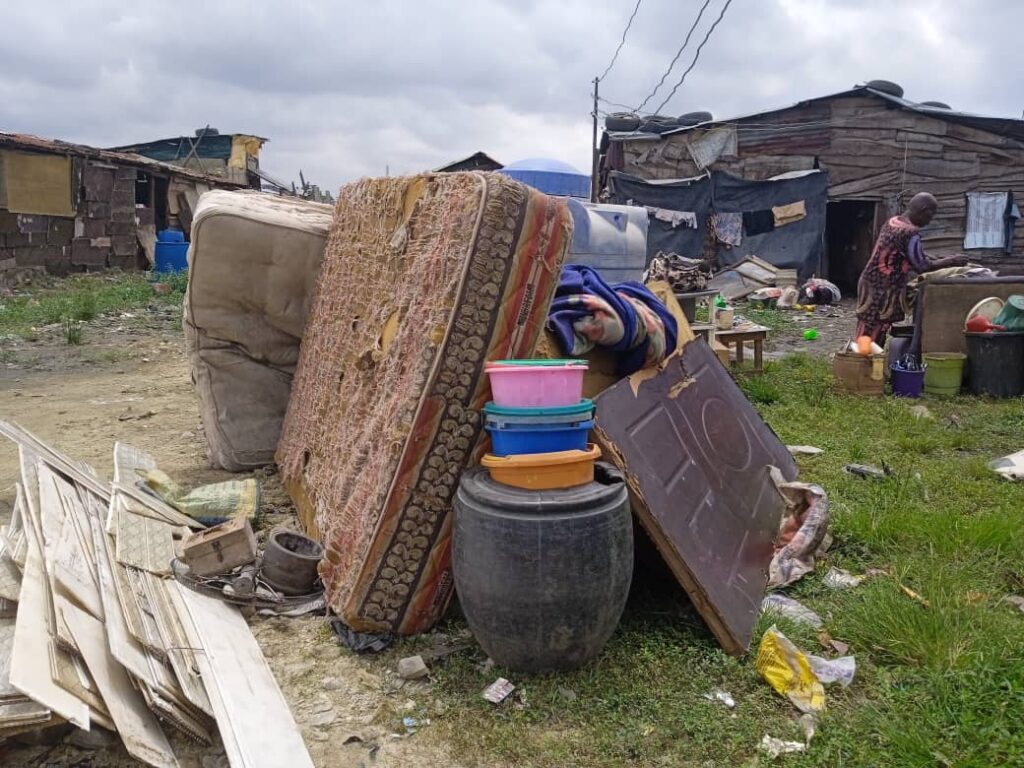Oworonshoki Demolition: Agonies Of Internally Displaced Person
Residents of Oworonshoki, a low-income residential community located at the entry point of the third mainland bridge in Lagos have been displaced and left to suffer after the state government demolished buildings without notice.

Many thought it would never happen.
“Why would they have to demolish our houses for no reason?” said Omowumi Soliu when she met a small group of residents in Oworonshoki area of Lagos some months ago, talking about a demolition planned by the state government.
In recent years the Lagos government has demolished different lagoon-side shanties to clear the way for wealthy developers to put high-cost houses on the land where the poor are displaced.
But in Oworonshoki, to be sure of what the future held, Omowumi and other residents consulted their community leaders, who told them there was no cause for alarm, they reassured them no one was coming for this bit of the shore.
Oworonshoki in Kosofe area of Lagos South West Nigeria, is a predominantly low-income residential community with a population of over 170,000. It sits on the lagoon shore and its eastern border is the highway that leads to the Third Mainland Bridge, the elevated road that links Lagos mainland with the upmarket neighbourhoods of the islands.
But on Thursday July 27, bulldozers roared through the streets of the community. A demolition task force arrived with an order from the state government to tear everything down.
According to multiple accounts, policemen attached to the squad gave only five minutes for people to pack up and leave before the destruction began.

In the blink of an eye, houses, shops, churches and mosques were razed, reduced to heaps of rubble.
By the time Omowumi returned from work, she saw that her house and many others in six streets of the area had been demolished. More than 4,000 buildings had become debris.
At this point, she could only think about the bitter tales that surrounded her experience of becoming a landlady in Lagos.
Bitter stories
Omowumi works as a security guard at the University of Lagos where she earns ₦35,000 ($45.38) monthly salary. Before securing the job in 2012, she worked as a cleaner at the residence of lecturers of the institution.
It was from the little savings she was able to purchase a piece of land in 2015 from a family who inherited the land from their forefathers, people often referred to as ‘Omo Onile‘ in Yoruba, meaning ‘land owners’.
She pays an annual land use charge to Lagos State Government, as most owners of low-income houses that are yet to get their certificates of occupancy (CofO) do. She thought that this conferred some legitimacy on her ownership title to the plot, as the state government accepted her money. Her certificates would one day arrive, she reasoned.
“It took me nearly six years before I was able to complete the four-room apartment I built. Even as I currently work as a security officer, I still do the cleaning job and that’s how I was able to get a shop for foodstuff and a provisions store in the area.

“Having seen my house demolished, I felt lightheaded but I controlled my emotions. Since I had no one nearby to help take out the goods in the shop, I had to return to work. By the time I returned the next day, the shop had been demolished with goods worth close to a million naira. This was a shop I got through donations and gifts from people whose houses I cleaned.”
Omowumi told HumAngle that her plan was to retire from the security job and cleaning services by the end of 2023.
“Now that the demolition has occurred, my retirement days are not even near because my children aren’t grown enough to feed themselves.”
Unlike Omowumi, a displaced resident who identified herself as Mummy Victor told HumAngle she rented a three-bedroom apartment in May and has paid for a one-year rent.
She’s now one of many displaced residents in the community.
“I could not take any of my properties out of the house. I cried repeatedly but could not stop them from carrying out the demolition. I slept under the rain for four days before finding a church where I squat.
“I have been disturbed psychologically because it happened unexpectedly. As I speak, I have no single property including clothes. A lot of people have been ruined. No amount of palliatives can help,” she said, weeping during a telephone conversation with HumAngle.
The septuagenarians
A 70-year-old widow, Bisi Sodeinde, was looking for a place to pass the night on Aug. 8, when our reporter spoke to her on the telephone.
As she tried to conceal her tears, she said “in all things, let’s give glory to God.”
Her reason for appreciating God was that she was fast adapting to living in the open after her house was demolished.
“I fainted when the four-room apartment my late husband left behind was demolished. I thank God that I am now getting better and getting used to living in the open at night. I thank God because many of us did not lose our lives in the cause of eviction,” she explained.
Her late husband left four children behind. They have all been scattered since their building was brought down and only communicate on the phone.
“The oldest of my children just graduated from university and he’s yet to secure a job to take care of his siblings. I want Nigerians to help us because we sleep in the open every night. We didn’t pick anything from the house.”

Another septuagenarian, who simply identified herself as Mama Alhaji, also said her charcoal business was destroyed during the demolition exercise.
Her words choked by tears, she said: “I have been living here at number 32, Oke-eri street, Oworonshoki for over 33 years. I didn’t receive any notice before the demolition. When I saw that many houses were being destroyed, I begged people to help pack some of my belongings out.”
On his part, Tunde Adigun said the shirt he put on that morning is still the one he has on seven days later. He returned to see his house had turned to ashes.
“Where do I want to start?” he said, “My wife and granddaughter now lay a wrapper in the cold, while I help them chase mosquitoes with a hand fan at night. Rain beats us here, and the sun.”
Following his predicament, Adigun considered taking his family to his friend’s house on the island to squat but “they also live in a room apartment. I can’t go and squat with a family of five living in one room.”
The actions of the government have however led to protest by residents who went to the state’s government secretariat to express their anger.
Lagos and forceful evictions
Due to its economic prospects pulling people in, Lagos is Nigeria’s most populous city. More people arrive every day. But high rent rates mean many people move to slum communities such as Oworonshoki.

As the state continues to grow into a megacity, slums and coastal villages are being razed by the government, causing the displacement of many.
The government has carried out evictions and demolitions in several communities close to the lagoon shore such as Otodo-gbame, Monkey village, Takwa bay, Oke-egan among others. These have been done under the premise of concern for the people’s safety, with risks such as climate change, increasing water levels, and poor sanitary conditions being given as reasons.
But Juwon Sanyaolu, national coordinator of Take It Back Movement (TIB), a civil rights organisation, explained Lagos has been notorious for displacing people from slums, so they can be replaced by upmarket estates.
“Lagos has a trend of demolishing houses that citizens go the extra mile to provide for themselves. They do this to enable them to build estates and high rise buildings that the poor cannot enjoy. While the government makes a lot from this, the poor bear the brunt.”
Housing should be considered primary welfare, which the government should provide to a level of quality fit for habitation by its citizens, he said.
As of 2017, nearly two million Lagosians have been forcibly evicted from their homes and workplaces by the state government over the last two decades, Amnesty International says.

The development in 2017 alone led to the death of 11 people and 17 were missing after faceoff between security operatives enforcing evictions and unidentified armed men resisting.
This action exacerbates inequality, social conflict, and segregation. It also leads to the marginalisation of the poor.
There is a big shortage of housing in Nigeria. The Bank of Industry, says there is an estimated housing deficit of 28 million units -the gap between what the country has and what it needs. To bridge this gap Nigeria would need to spend ₦21 trillion, they say.
Authorities
While the spokesperson of Lagos Governor, Gboyega Akosile, and the State’s Commissioner of Information, Gbenga Omotoso, are yet to respond to enquiries on reasons for the demolition of houses in Oworonshoki, an aide to the governor who spoke to our reporter under anonymity because he’s not authorised to speak claimed the government had “only demolished shanties”.
He alleged that criminals who commit crimes at the third mainland bridge axis often run to the Oworonshoki area to hide.
This claim was denied by residents, however. They told HumAngle that every community has criminals and people in Oworonshoki frown at illegal acts.
Meanwhile, the state’s House of Assembly has ordered the environmental and special offences enforcement unit of the government to stop the demolition of houses in Oworonshoki.

The order was made after a legislator, Sanni Okanlawon, raised a matter of urgent public importance, saying the demolition squad had claimed that only shanties would be pulled down but the team went beyond the shanties and demolished a lot of other buildings.
Following this, the speaker of the assembly, Mudashiru Obasa, set up a five-member ad-hoc committee to investigate the matter and report to the lawmakers.
Legal action
HumAngle also learnt that the displaced residents of Oworonshoki have decided to take legal action aided by the Take It Back Movement (TIB).
Sanyaolu, leader of the movement said the demolition of homes in the community has made a lot of people, including women and children homeless.
“Needless to say, the provision of security, welfare, and shelter is integral to the fundamental aims and objectives of the government. Rather than increasing the already embarrassing rate of homelessness in the state through demolitions, the state should massively invest in low-cost housing projects.”
On Friday, Aug 11, a human rights lawyer, Tope Temokun, was briefed about the displacement of the Oworonshoki people in preparation for proper legal representation.
He is hopeful that they have a good case, Temokun said; “One thing I know is that it is a matter of time, but the people shall be victorious.”
Summary not available.
Support Our Journalism
There are millions of ordinary people affected by conflict in Africa whose stories are missing in the mainstream media. HumAngle is determined to tell those challenging and under-reported stories, hoping that the people impacted by these conflicts will find the safety and security they deserve.
To ensure that we continue to provide public service coverage, we have a small favour to ask you. We want you to be part of our journalistic endeavour by contributing a token to us.
Your donation will further promote a robust, free, and independent media.
Donate HereStay Closer To The Stories That Matter




